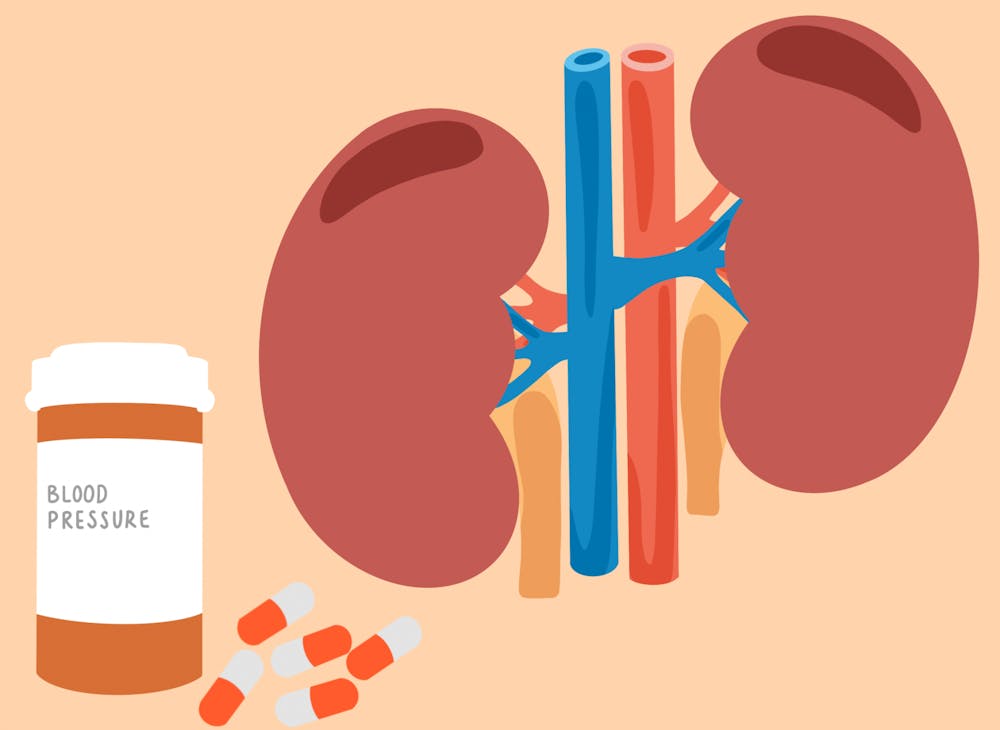New research out of School of Medicine suggests that long-term use of certain blood pressure medications may cause kidney damage. The research suggests blood pressure medications — known as angiotensin-converting enzyme inhibitors designed to lower blood pressure by relaxing veins and arteries — are associated with hardened kidney vessels. Blood vessels provide oxygen to the kidney, so vessel hardening restricts full kidney function.
Two researchers in the University’s Department of Pediatrics and Child Health — Ariel Gomez M.D. and Maria Luisa Sequeira-Lopez — have been working on this research since the 1990s in the Pediatric Center for Excellence in Nephrology. Both researchers went to medical school at the University of Buenos Aires School of Medicine in Argentina before completing their residencies in pediatrics.
Their latest research focuses on renin cells, specialized cells of the kidney that are crucial to the development of blood vessels and structures that feed the kidney. Long-term blood pressure medications block the hormone system that regulates blood pressure, which their research suggests can cause malformations in the kidney vessels. For this reason, blood pressure medications are known to be dangerous during pregnancy.
Gomez and Sequeira-Lopez’s research suggests that long term use of certain blood pressure medications could have potentially dangerous secondary consequences for more than pregnancies. As indicated by the name, these medications work to lower blood pressure by inhibiting ACE from producing angiotensin II, a protein that increases blood pressure by narrowing blood vessels. Inhibiting this feedback loop causes the kidneys to make more renin in response.
“[The kidneys] will continue making renin, increasing the number [of renin cells], and they will also make some matrix proteins,” Sequeira-Lopez said. “This ends up making the vessels in the kidneys sick. So this is something that can happen, [it] does happen in mice and could happen in humans.”
The long-term increase in renin production generates an increase in smooth muscle cells, causing blood vessels in the kidney to thicken and stiffen, preventing normal blood flow. This is called renal stenosis.
Sequeira-Lopez said the next steps in their research will be to find a way to prevent stenosis from happening by continuing to study renin cells and the find factors or proteins causing these potential secondary consequences.
Gomez and Sequira-Lopez’s research uses mice, renin in culture and biopsy cells, but the pair noted the need for clinical studies on the effects for humans.
“There should be clinical studies that better investigate the function of the kidneys,” Sequeira-Lopez said. “There is some evidence that [kidney damage] could also happen in humans from the studies from biopsies in the past. But, we need to move forward and make better studies and make sure that the kidneys are protected as well as your life.”
Sequeira-Lopez emphasized that people should not stop taking their long-term blood pressure medications as they are vital to preventing hypertension and heart disease. For now, protecting against these medical issues takes top priority. The research in this lab is working to find better medications for the future that can reverse fibrosis – the thickening and scarring of kidney tissue – helping heal blood vessels.
Research physician Dr. Alexandre Martini said that he joined Gomez’s lab four years ago because Gomez is one of the world leaders in the study of renin producing cells and the University provides the resources he needs.
“At U.Va., I have the environment to perform this kind of research.” Martini said. “With techniques that are very new, it would be very hard to have access outside. But here at U.Va., we have a lot of good people that work with the techniques.”
The success of this work is inspiring to pre-medical students interested in neprology, first-year College student Will Gansereit said.
“I'm interested in nephrology and so being able to have those resources right here at U.Va. is really cool.” Gansereit said. “It's a community of groundbreaking research.”
While the work they do is grounded in the U.Va. Health system, Martini said their work also requires support from research and analysis teams of U.Va. Health.
“Today, it's impossible to make science alone,” Martini said. “We always get input from other groups and other techniques, especially the analysis of the sequencing that bioinformaticians contribute to. So it's not only a team, it's a network to make science better.”







